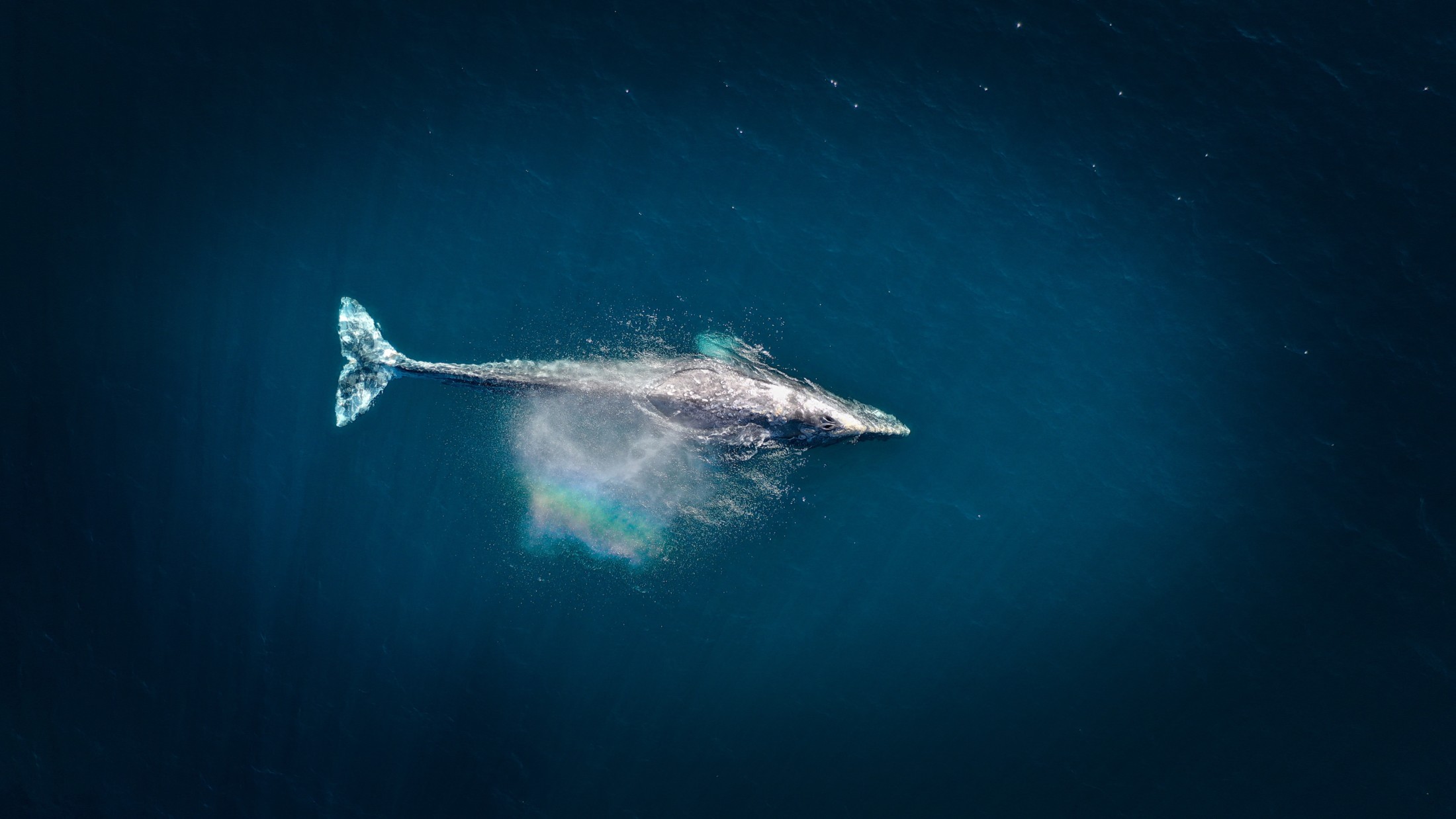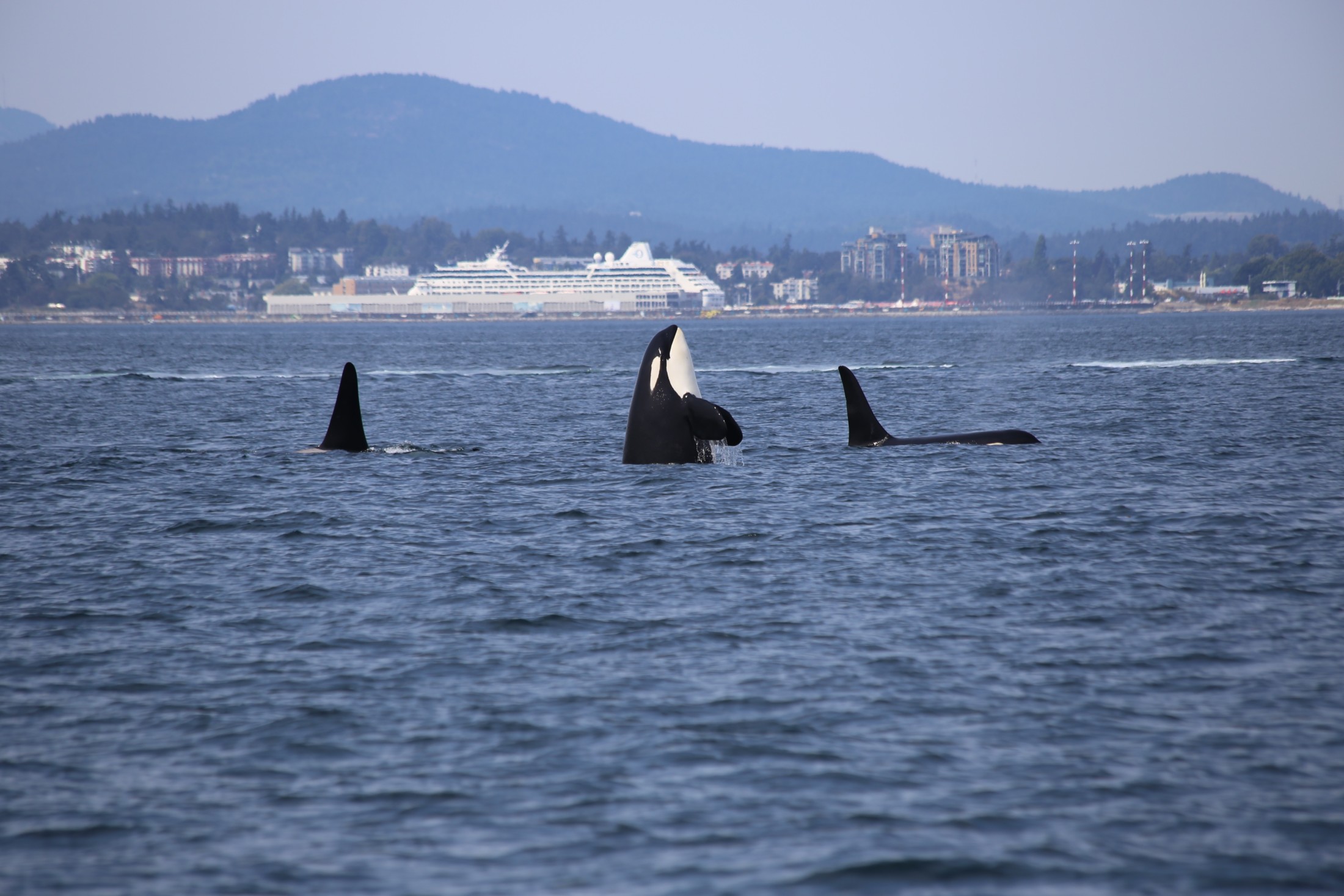An Important Time To Learn About the Oceans
While we still don’t know how quiet it’s going to get, the effects of the silence are already rippling through the ocean — but they won’t last forever.
“We get this window, we get a snapshot into life without humans. And then when we come rushing back, that window will close,” says Cornell University marine acoustician Michelle Fournet.
“It’s really an important time to listen.”
A Tragedy, An Opportunity To Study
The morning after the Sept. 11 terrorist attacks, everything grew unusually quiet. Especially in North America, the flow of people and goods through the air and across the oceans dwindled out of fear and uncertainty — as though the movement and commerce that had gone uninterrupted for half a century needed a moment to reflect.
The tragedy and its aftermath also presented a rare opportunity to study how all that activity was affecting some of the most endangered animals on the planet.
While the world was still in shock that morning, researcher Manuel Castellote set off in a boat from Woods Hole Oceanographic Institution in Falmouth, Massachusetts, as he and collaborator Susan Parks had done many times before. They were collecting data for a study on the social behaviour of North Atlantic right whales, but the noise environment had changed drastically overnight.
The absence of ship noise, unexpected and impossible in most circumstances, allowed the researchers to study the whales in a quiet environment.
The resulting paper was a milestone in the understanding of the link between noise pollution and whales.
- By combining analyses of collected whale droppings (they float) and underwater recordings, Parks and her colleagues determined that ship noise is correlated with stress in whales.
- Parks is careful to explain that correlation does not prove causation, but other researchers are more confident about what the finding can tell us about how whales respond to noise.
“That paper is pretty beautiful evidence that industrial noise does have a stress impact on marine animals,” explains David Barclay, an ocean acoustics researcher at Dalhousie University.
researching another quiet time
Now, the oceans have gone quiet again. Just like after 9/11, worldwide trade and movement has slowed. But this time, the tragedy is more widespread and longer lasting. The World Trade Organization noted in its March 11 barometer that container shipping and passenger air travel were the hardest hit industries, but most of the effects have not yet been measured.
Statistics Canada data is similarly subject to lag, but in February the agency was already reporting a combined reduction in imports and exports of more than 16 per cent compared to the year before.

A dramatic decline in demand for goods from China has led to a sharp increase of port storage facilities globally. The resulting drop in marine shipping provides a unique opportunity for researchers studying marine acoustics. Photo: Erik Odiin
Barclay and researchers in his lab seized the opportunity to measure how much change has occurred in the underwater noise environment.
- In a new paper, currently undergoing review, the researchers looked at real-time sound signals from underwater observatories on the seafloor off B.C.
- They found a notable drop in the amount of low-frequency sound off the west coast of Vancouver Island and in the Georgia Strait between Vancouver Island and mainland B.C. (Disclosure: the author’s brother, Dugald Thomson, is a member of the lab and the first author on the new study.)
Sound in the 100-hertz range — “pretty low on the piano keyboard,” Barclay says — dropped.
The amount of the drop varied depending on the location, but worked out to around 1.5 decibels, roughly a 25 per cent reduction in power. A sound’s power, however, does not necessarily align with how much disturbance it causes, especially considering the different hearing ranges of different species.
“A lot of the larger whales use sound in this range,” Barclay says. Baleen whales like humpbacks and grey whales use low-frequency sounds to navigate and communicate over long distances. Meanwhile, toothed whales, like killer whales and porpoises, rely on higher-pitched sounds for their hunting and communication.
Three days after the Barclay lab paper was sent for review, BC Ferries cut the frequency of sailings on its major routes in half, but whatever decrease in noise this caused would be on top of what was described in the paper — meaning the oceans have already grown quieter than reported.
Research on Pandemic Effect on Underwater Life Needed
Fournet studies humpback whales in Southeast Alaska, where cruise ships have polluted the underwater soundscape for decades. There are entire generations of whales that have never had a quiet day in their feeding grounds.
Now, Fournet says, “we can learn something not just about how these animals respond to noise, but about how these animals communicate at all.”
While Fournet, like other scientists, is afraid of what the economic downturn may mean for her funding, she’s dedicated to taking this rare opportunity to study the whales.
“If nobody funds this project, I am going to go into my savings account, I’m going to fly a hydrophone to Alaska and I’m going to pay for a boat to go out and put it in the water. And then I’m going to analyze that data on Saturday and Sundays, because it’s important,” she says.

Grey whales only live in the Pacific Ocean. Previous Atlantic Ocean populations were hunted to extinction. On the Pacific coast grey whales were nearly hunted to extinction, but in 1946 international protections were put into place, allowing the population to rebound from about 2,000 individuals to around 26,000 today. Photo: Cameron Venti
Noise can disturb killer whales’ communication, hunting
John Ford is one of the world’s leading experts on killer whales. As a former Fisheries and Oceans Canada scientist, he has spent a lot of time dropping hydrophones into the Georgia Strait.
“To adopt a precautionary approach, one would have to assume [general noise] reduces the active space — the area around individuals in which they can actually communicate,” he says.
Killer whales communicate around the 800-hertz range. But that’s not to say they can’t hear or aren’t disturbed by the lower-frequency noise made by big ships.
And then there’s echolocation: the whales’ hunting success depends in part on their ability to hear the faint echo of a sound bouncing off salmon that could be 100 metres away. That sensitive process likely requires at least some modicum of quiet in the environment, Ford says, something they’re less likely to get in a busy shipping channel.
Aarhus University bioacoustics researcher Chloe Malinka says there is evidence that even when sound doesn’t overlap with the pitches the whales use to find food, “in many instances they just completely stop echolocating, or they change their foraging behaviour.” Sometimes whales stop hunting, which wastes valuable energy.
It’s not hard to imagine why: as anyone newly working from home can attest, there are all kinds of noises that can cause a disturbance, not just those that mask the precise sound the listener is trying to hear.
“Is it like living next to the airport — does it cause stress?” Barclay asks.
Finding the answer may require a repeat of Parks’s study following the Sept. 11 attacks. But such studies, which require labs and up-close encounters with whales, are expensive.
“Given the way the economy is right now, it might be that nobody can afford to fund us, and that’s a big fear that scientists have right now,” she says.

Orcas near Victoria B.C. In 2019 Victoria was the port of call for 257 cruise ships. The cruise industry is mostly suspended due to the COVID-19 pandemic. Photo: Dick Martin
‘It shouldn’t take a human calamity’
Many people are already asking, when can the economy start running again, when can cruise ships make their way up the coast again?
Michael Jasny, a marine mammal expert at the U.S. Natural Resources Defense Council, thinks they’re asking the wrong question.
“One of the critical questions we’re facing, environmentally, is what kind of world we go back to once this catastrophe has passed,” he says.
“Do we rebuild the economy along the same, unsustainable and destructive lines as we have previously, or do we take the opportunity to build a greener economy and a more sustainable world?”
The reduction in marine noise isn’t yet fully understood, but what is known so far appears to indicate a noise environment that’s somewhat closer to what the oceans would have sounded like 150 years ago.
Not quiet, exactly — non-human noise like waves, wind, rain and even shrimp have always made a natural racket — but not full of the noise of human-made engines.
quieter ocean healthier marine life?
The effect of that quieter ocean would likely be healthier marine mammals. Free from the distraction and stress we cause, hunting would become easier, mating more convenient and wayfinding more obvious.
Turning down the volume could protect many more species than whales.
A 2017 study found zooplankton can be killed by high-intensity noises, while tens of thousands of fish species are able to hear, and many use sound to communicate. With humans’ limited knowledge of marine life, the extent of what a quieter ocean would protect isn’t fully known.
“It shouldn’t take a human calamity to achieve those benefits,” Jasny says.
COVID19 Natural World Benefits Shortlived
In all likelihood, the benefits to the natural environment will be short-lived. But Fournet says the “snapshot” being produced right now is just that: a chance to hear how the pre-industrial world sounded.
“It’s not going to be the saving grace of nature,” she says. “What’s going to be the saving grace of nature is when we take that snapshot and we blow it up to poster size and we share it with the world, and people realize what kind of an impact we have.”
Did you subscribe to our daily newsletter?
It’s Free! Click here to Subscribe!
Source: The Narwhal
















